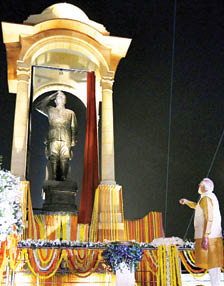The most contentious issue has been replacing and rejecting vestiges of India’s colonial past and replacing it with ones that reflect the nature of our civilization.
NEW DELHI: Historical events and pasts are a debatable phenomenon which become highly contentious issues in conversations between people, among academics and writers who re-evaluate the evidence and offer some new insights. In the history of any country in the world, there has been not a time when the analysis of past events and given historical truths have been questioned or debated upon. Indian history, given our civilization that dates back to thousands of years, has always been a contentious issue among historians. Much of the criticism has been towards erasing India’s glorious past and replacing it with a new one. But the question remains: which interpretation and whose interpretation are we questioning and reassessing?
The most contentious issue has been replacing and rejecting vestiges of India’s colonial past and replacing it with ones that reflect the nature of our civilization. The Prime Minister’s latest effort to rename many roads, symbols and install ones which reflect the pride and glory of Indian civilization on the 75th year of Independence when every citizen has been welcomed to participate and celebrate the idea of India, is a laudable effort. The renaming of Rajpath or Kingsway as Kartavya Path is one such effort at erasing the last vestiges of the Raj under whose watch millions of Indians suffered to keep the Raj going, man-made famines devastated the lives of millions in Bengal 1943, a famine that was never acknowledged and for which we never received any reparations. The Rajpath was also a symbol of many durbars that took place to welcome to monarch to their colony India. It was a symbol of colonial pomp and show sucked out of the blood of millions of exploited Indians who were banished in jails, who were condemned every time they dared to raise their voice against an imperialist state. To change it into a symbol reflecting the duty to the nation must be welcomed. In a country, where we have the tradition of naming airports, national parks, universities, state buildings and roads after “select” former Prime Ministers—Jawaharlal Nehru, Indira Gandhi and Rajiv Gandhi—this effort by Prime Minister Narendra Modi of putting the nation before self must be lauded. The renaming of Nehru Memorial Museum and Library as Pradhan Mantri Sangrahalaya or museum is an ode to every Prime Minister, from Choudhary Charan Singh, Morarji Desai, I.K. Gujral, Narasimha Rao to Manmohan Singh who have served the country. The Sangrahalaya does justice to the service of every Prime Minister without acts of omission which has been the order of the past, which is well documented in the book, Half Lion, by Vinay Sitapati. Sitapati’s book was an important step in highlighting the contribution of P.V. Narasimha Rao, a Prime Minister and Congressman forgotten by his own party and abandoned by his own. The new flag of the Indian Navy replacing the one with connections to our civilizational spirit of bravery and resilience of Chhatrapati Sivaji is an effort to reflect the “new idea of India”, which draws its strength from its civilization. The installation of Netaji Subhas Chandra Bose’s statue at the India Gate and the War Memorial acknowledging the contribution of every soldier who laid down their lives in the service of the country is an effort to celebrate the contribution of every citizen in the country, and not just a “select few”. Bose is an example of another freedom fighter who had been relegated to the background and brought to life to suit political ends from time to time.
It’s time we question and reassess what is the idea of India? Is it selective or inclusive? Nehruvian Secularism championed by India’s first Prime Minister and the Congress party
Dr Aishwarya Pandit Sharma is Associate Professor, Jindal Global Law School.

